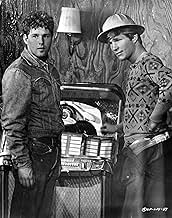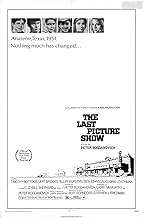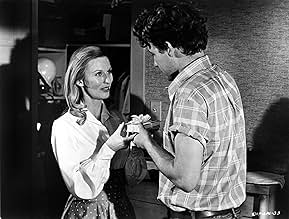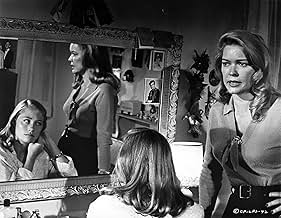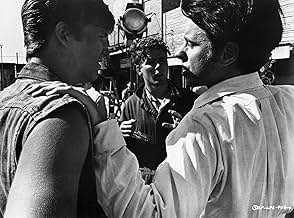1951 में, हाई स्कूलर्स का एक समूह एक अंधकारमय, अलग-थलग, एट्रोफिड उत्तरी टेक्सास शहर में उम्र का आता है जो धीरे-धीरे सांस्कृतिक और आर्थिक रूप से मर रहा है।1951 में, हाई स्कूलर्स का एक समूह एक अंधकारमय, अलग-थलग, एट्रोफिड उत्तरी टेक्सास शहर में उम्र का आता है जो धीरे-धीरे सांस्कृतिक और आर्थिक रूप से मर रहा है।1951 में, हाई स्कूलर्स का एक समूह एक अंधकारमय, अलग-थलग, एट्रोफिड उत्तरी टेक्सास शहर में उम्र का आता है जो धीरे-धीरे सांस्कृतिक और आर्थिक रूप से मर रहा है।
- 2 ऑस्कर जीते
- 19 जीत और कुल 22 नामांकन
- Charlene Duggs
- (as Sharon Taggart)
फ़ीचर्ड समीक्षाएं
This is one of those rare movies that you can go back every five years and watch for the first time. Myself having been raised in Del Rio, Texas in the late 50's and early sixties, I can attest that this is a totally accurate picture of what coming of age in west Texas was really like for most of us.
क्या आपको पता है
- ट्रिवियाCybill Shepherd was cast with the option of backing out of her nude scenes if she so desired. She only agreed to do them after asking the opinions of three female costars - Cloris Leachman, Ellen Burstyn, and Eileen Brennan, who all thought she should do them.
- गूफ़The lavalier mic on Duane's tie is visible during the graduation scene.
- भाव
Sam the Lion: You boys can get on out of here, I don't want to have no more to do with you. Scarin' a poor, unfortunate creature like Billy just so's you could have a few laughs - I've been around that trashy behavior all my life, I'm gettin' tired of puttin' up with it. Now you can stay out of this pool hall, out of my cafe, and my picture show too - I don't want no more of your business.
- इसके अलावा अन्य वर्जनSpecial edition includes seven minutes of footage not included in the original release.
- कनेक्शनFeatured in The Last Picture Show Re-Release Promo (1971)
- साउंडट्रैकCold, Cold Heart
(uncredited)
Written by Hank Williams (as Hank Williams Sr.)
Performed by Tony Bennett
टॉप पसंद
- How long is The Last Picture Show?Alexa द्वारा संचालित
- What is 'The Last Picture Show' about?
- Is 'The Last Picture Show' based on a book?
- Where is Anarene, Texas?
विवरण
- रिलीज़ की तारीख़
- कंट्री ऑफ़ ओरिजिन
- भाषा
- इस रूप में भी जाना जाता है
- La Última Película
- फ़िल्माने की जगहें
- उत्पादन कंपनियां
- IMDbPro पर और कंपनी क्रेडिट देखें
बॉक्स ऑफ़िस
- बजट
- $13,00,000(अनुमानित)
- US और कनाडा में सकल
- $2,91,33,000
- दुनिया भर में सकल
- $2,91,46,746
- चलने की अवधि1 घंटा 58 मिनट
- रंग
- ध्वनि मिश्रण
- पक्ष अनुपात
- 1.85 : 1
इस पेज में योगदान दें






